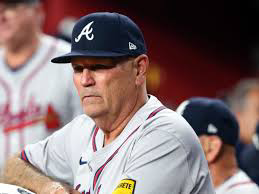
The Atlanta Braves’ Managerial Future: Evaluating Brian Snitker’s Tenure and Potential Successors
The Atlanta Braves, a prominent team in Major League Baseball (MLB), are currently experiencing a period of reflection regarding their managerial leadership. Brian Snitker, who has been at the helm since 2016, is widely respected within the baseball community for his leadership and experience. However, as the team evaluates its performance and future direction, discussions have emerged about the possibility of a managerial change at the conclusion of the current season.

Brian Snitker’s Legacy and Current Status
Brian Snitker’s tenure with the Braves has been marked by significant achievements, including leading the team to a World Series championship in 2021. His leadership style, characterized by a calm demeanor and a focus on player development, has earned him the admiration of players and staff alike. Despite these successes, there are considerations about the team’s performance in recent seasons and whether a change in leadership could further propel the Braves toward sustained success.
As Snitker advances in age, questions arise about his long-term plans and whether he intends to continue managing at the MLB level. The Braves’ front office is reportedly engaged in discussions about the team’s trajectory, and part of this evaluation includes assessing the effectiveness of the current managerial leadership.
Potential Successors: David Ross as a Candidate
In exploring potential candidates to succeed Snitker, one name that has surfaced is David Ross. Ross, a former catcher with a distinguished MLB career, has managerial experience with the Chicago Cubs, where he served as the team’s manager from 2020 to 2023. During his tenure, Ross led the Cubs to a division title in 2020 and was recognized for his leadership qualities, finishing third in the National League Manager of the Year voting that same year.
Ross’s managerial approach blends traditional baseball wisdom with an openness to analytical insights, making him a compelling candidate for a team like the Braves, which values both aspects. His familiarity with the Braves organization, having played for the team from 2009 to 2012, adds an additional layer of connection that could facilitate a smooth transition.
However, Ross’s tenure with the Cubs concluded in 2023 when he was relieved of his managerial duties. Despite this, his reputation as a respected leader in the clubhouse and his experience in managing a major league team position him as a viable candidate for the Braves should they decide to pursue a managerial change.
Considerations for the Braves’ Front Office
The decision to change managers is a significant one, involving various factors beyond the manager’s immediate impact on game outcomes. The Braves’ front office must consider the long-term vision for the team, including player development, organizational culture, and alignment with the team’s strategic goals.
If the Braves opt to move in a new direction, they will likely seek a candidate who not only possesses managerial experience but also aligns with the team’s values and objectives. David Ross’s background suggests he could meet these criteria, offering a blend of experience, leadership, and familiarity with the Braves’ organizational culture.
Conclusion
As the Atlanta Braves approach the end of the current season, discussions about the future of their managerial leadership are gaining attention. Brian Snitker’s contributions to the team are undeniable, but the evolving landscape of the MLB and the Braves’ aspirations may prompt a reevaluation of their leadership structure. David Ross emerges as a potential successor, bringing with him a wealth of experience and a connection to the Braves’ history. The coming months will be pivotal as the Braves’ front office assesses its options and determines the best path forward for the team’s continued success.
Rafael Devers’ Trade to the San Francisco Giants: A Turning Point for the Boston Red Sox
In a surprising move that has sent ripples through the baseball community, the Boston Red Sox have traded star third baseman Rafael Devers to the San Francisco Giants. This decision marks a significant shift for the Red Sox, who have long considered Devers a cornerstone of their franchise.
Background and Performance
Rafael Devers has been a key player for the Red Sox since his debut in 2016. Over the years, he has established himself as one of the premier hitters in the league, known for his power and consistency at the plate. In the 2025 season, Devers was performing at a high level, with a batting line of .272/.401/.504, 15 home runs, and 58 RBIs.
Despite his on-field success, tensions began to surface between Devers and the Red Sox organization. The catalyst for these tensions was the team’s decision to acquire third baseman Alex Bregman, which led to a proposed shift in Devers’s position. Initially, Devers was asked to transition to designated hitter, a role he accepted. However, when the team later suggested a move to first base, Devers expressed reluctance, leading to a strained relationship with the organization.
The Trade to San Francisco
The culmination of these tensions was the trade that sent Devers to the Giants in exchange for pitcher Kyle Harrison, reliever Jordan Hicks, and prospects James Tibbs III and Jose Bello. The trade took place just before the Red Sox were set to board a flight to Seattle, underscoring the urgency and unexpected nature of the move.
Red Sox manager Alex Cora addressed the situation, acknowledging the challenges in managing the relationship with De…
Leave a Reply